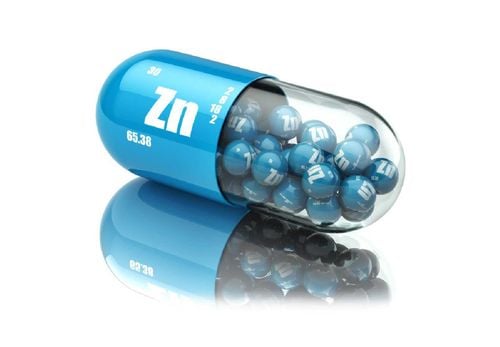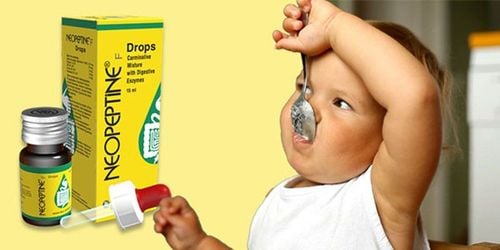This is an automatically translated article.
Each age of children will have different needs to use zinc, supplementing with enough zinc will help children develop comprehensively in terms of weight, height, physical and intellectual, and also help reduce the risk of cancer. disease risk in children. So what is the recommended zinc requirement for a 7-11 month old baby?1. What is the need for zinc in children from 7 to 11 months old?
Zinc requirements are determined based on the age group, sex, physiological status of the child and the biological value of zinc in the diet. Specifically, zinc requirements in children from 7 to 11 months are as follows:With good absorption: 0.8 - 2.5 mg/day. Good absorption means good zinc biological value = 50% with diets high in animal or fish protein. With moderate absorption: 4.1 mg/day. Moderately absorbed means that the biological value of zinc is average = 30% in a diet containing moderate animal or fish protein. With poor absorption: 8.3 mg/day. Poor absorption means low biological value of zinc = 15% with diets with little or no animal or fish protein. Thus, children need to supplement zinc through diet or substitute products such as functional foods, drugs, because the diet will not provide enough zinc for children.
2. Zinc-related pathology
2. 1. Causes of zinc deficiency Zinc deficiency in humans is quite rare, but does not mean that it is not. Because zinc is involved in many important metabolisms in the body, the symptoms and syndromes caused by mild zinc deficiency are varied and highly variable. Basic but not specific symptoms and syndromes of zinc deficiency include:Growth retardation Hair loss Diarrhea Delayed sexual maturation and loss of fertility Skin and eye damage Decreased appetite 2 2. The pathology of zinc excess Currently, there is no evidence to suggest adverse effects from excess consumption of zinc from natural foods. Adverse effects associated with long-term dietary zinc supplementation include suppression of the immune system, decreased high-density lipoprotein (HDL) cholesterol, and decreased copper. Other possible side effects of excess zinc supplementation include:
Acute effects: Includes epigastric pain, nausea, vomiting, loss of appetite, cramps, headache and diarrhea. Zinc supplementation at doses of 225-450 mg has been assessed to induce vomiting. Gastrointestinal symptoms have been reported with zinc supplementation at doses of 50-150 mg/day. Impaired Immune Function: When using 300mg/day zinc supplement for 6 weeks can cause impaired immune function.

Trẻ thiếu kẽm có thể bị chán ăn, rụng tóc
3. How to meet children's zinc needs?
3.1. Diversify meals It is necessary to combine a variety of foods from the 4 main food groups in daily meals. The diet should provide enough energy and nutrients including zinc. Breastfeeding and appropriate complementary feeding are the best ways to prevent zinc deficiency in young children. Enhance zinc absorption in young children by using foods rich in vitamin C such as green vegetables and fruits. You should use processing methods such as sprouting (bean sprouts), fermenting (pickles...) because these processes increase vitamin C content and reduce phytic acid in food thereby increasing absorption. zinc from the diet. Promote and support breastfeeding: Mothers should breastfeed within the first half hour after birth and exclusively breastfeed until 6 months of age and continue to breastfeed for up to 24 months. You should use foods rich in zinc, including: Animal foods such as oysters, dungeness crab, shrimp, beef, meat, fish. These foods do not contain zinc absorption inhibitors. Take zinc supplements by mouth as directed by a healthcare professional. 3.2. Prevent and treat diseases to help prevent zinc deficiency Immunize children on schedule to prevent infections such as measles, whooping cough, diphtheria, tetanus, polio, tuberculosis, hepatitis B, Japanese encephalitis . Children 2 years of age and older need to be dewormed every 6 months. You need to monitor your child's growth and development. 3.3. Prevention of zinc deficiency by taking zinc supplements The doctor will prescribe a dose of oral zinc supplement to prevent zinc deficiency for subjects at risk of zinc deficiency.Children from 7 months to 3 years old: Should add 5mg of elemental zinc/day. Children from 4 to 13 years old: Should add 10mg of elemental zinc/day. Adults: Should supplement with elemental zinc 15mg/day. Pregnant women need to be supplemented with 15-25mg of elemental zinc/day. Zinc supplements can be used in batches from a few weeks to a few months, zinc supplementation is necessary for:
Children with poor appetite, slow weight gain. Children are not breastfed. Babies born prematurely with low birth weight, or with fetal malnutrition. Pregnant women.

Mẹ có thể dự phòng thiếu kẽm cho trẻ bằng viên uống bổ sung kẽm
For more nutritional knowledge and child care for each age, parents should regularly visit the website vimec.com and make an appointment with the leading doctors, pediatric and nutrition experts of the National General Hospital. Vinmec when needing advice on children's health.













